Cuddling koalas is big business for Sydney private zoo
- Published
There are more than 2,000 native animals at Featherdale Wildlife Park
"Do not feed the animals" is not a sign you will see at one of Australia's largest privately run zoos.
The Featherdale Wildlife Park on the fringes of Sydney offers visitors a "unique" hands-on experience that keeps coach loads of people flocking through its doors.
Cuddling koalas, hand-feeding kangaroos or patting reptiles are just some of the up-close and personal experiences that keep the zoo thriving in Australia's highly competitive wildlife tourism market.
"This is definitely a profitable operation. There's a lot to see and do," says Tim Sinclair-Smith, who runs the zoo.
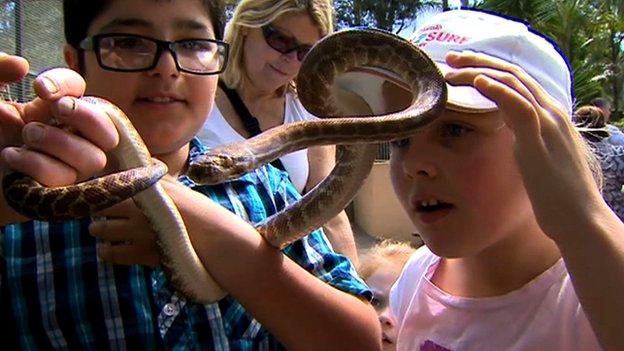
The privately run zoo gives visitors a "hands-on" experience with Australia's native animals to attract visitors.
"There are a lot of presentations and shows that are happening all the time and the public come and interact with the animals.
"That is one of the ways we've been able to continue to be competitive with other zoos out there. In fact we don't really see other local zoos as competitors because we believe we have our own niche."
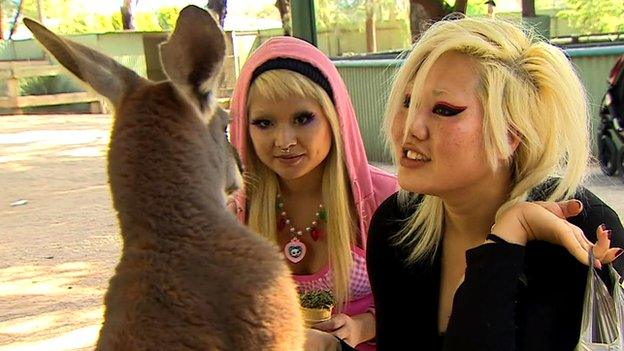
Feeding the animals at the zoo costs about A$187,000 per year
There are more than 90 accredited zoos in Australia, all seeking to cash in on people's fascination with the country's native wildlife. Australia's wildlife tourism industry has an annual economic impact of several billion Australian dollars, according to the government.
In fact, nearly 70% of tourists travelling to Australia want to see native animals during their visit.
'Not cheap'
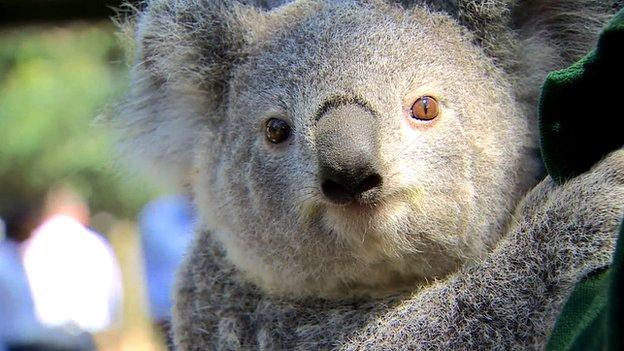
Koalas eat about two-and-a-half pounds of eucalyptus leaves a day
Over 350,000 people visited Featherdale last year, contributing to a turnover of A$9.2m ($8m; £5m). Only 47% of visitors were tourists.
"There can be a lot of money made," Mr Sinclair-Smith says. "But it is an expensive business as it's not cheap to look after animals. But our job is to ensure we're giving a great product."
Running a zoo is a 365-day operation and animals need constant care. The operational costs at Featherdale were A$6.5m in 2013.
There are more than 2,000 native animals and it takes more than 100 people to look after them. Wages are the zoo's biggest outlay. Feeding the animals and ensuring their optimum welfare is the next biggest cost - A$187,000 a year.
The native koala is the most expensive animal to feed. Koalas sleep for 18 hours a day, but munch on a diet of eucalyptus leaves when they are awake.
It takes two staff to take the koalas off site to eat every day. The cost of these two and a car for four hours, plus feeding time at the park, is more than A$100,000 a year.
Setting up a world-class zoo is also very expensive due to the infrastructure required to provide optimum care for the animals - a brand new zoo could cost anywhere from A$50m upwards without the cost of land, Mr Sinclair-Smith says.
Star attraction
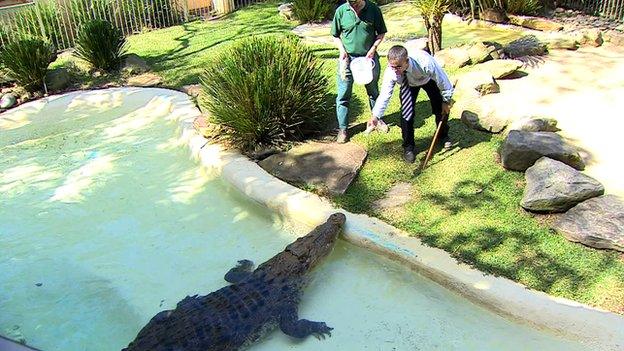
The zoo's star attraction is saltwater crocodile Ngukkhur. Feed at your peril!
But running a zoo is not all about profit. This is a clearly a business that must reconcile the welfare demands of the animals with the need to make money.
The highlight for many visitors to Featherdale is to get up close to Ngukkhur, a 4.7 metres long saltwater crocodile that weighs 500kg.
He has spent the last 22 years in captivity after being caught near an Aboriginal community in Australia's Northern Territory.
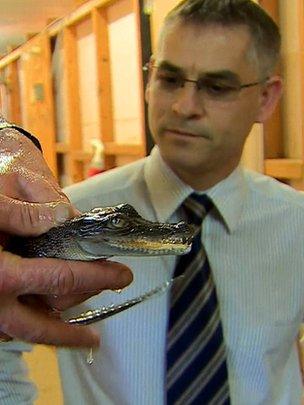
Zoos are not just about displaying animals but have a key role in saving species, says Mr Sinclair-Smith
"Our ultimate goal is to save species, to research, to find ways to save them in the wild, save their habitat or boost their numbers of populations if they're getting low," says Mr Sinclair-Smith.
"Zoos are no longer just about displaying animals for the sake of people looking after them. We actually have a valuable role in saving species.
"There would be a lot of species on this planet that would no longer be here if it wasn't for zoos and aquariums."
Featherdale rarely buys animals for the park, instead trading or acquiring surplus animals from other institutions.
Ngukkhur is a case in point. A troublesome crocodile when he lived in the Northern Territory, the local authorities deemed him "too dangerous" to live there and moved him to a local crocodile farm. But Ngukkhur didn't like the other crocodiles and kept attacking them.
"Fortunately, he was granted permission to live a wonderful solitary life at Featherdale," says Mr Sinclair-Smith.
Although Ngukkhur is one of the largest animals at the zoo, he is also one of the cheapest to feed.
Crocodiles eat very little in relation to their size. Ngukkhur is only fed during the warmer months and eats the equivalent of 1.5 chickens a week, meaning his total food bill for the year is just A$600.
'Right balance'
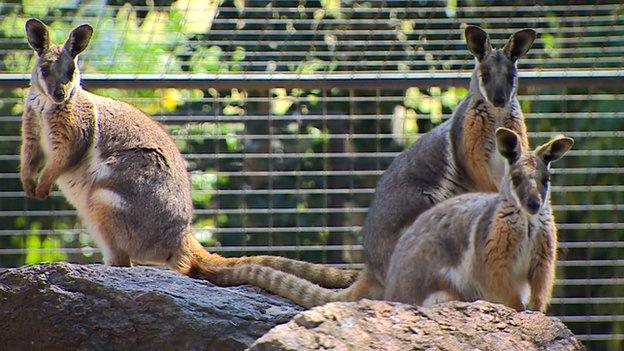
Kangaroos' legs cannot move independently of one another, so they must hop everywhere
Featherdale is celebrating its 42nd birthday this year.
"It is a private enterprise," says the zoo's chief curator Chad Staples.
"We receive no government support at all, so in order to provide everything the animals need but still allow the visitors to have the experience they want to have, it is huge. But I think we get that balance right.
"We have enormous success with our animals in order to breed consistently. We do better each year, which shows that at least we're doing something right.
"People are voting with their feet and they keep coming back."